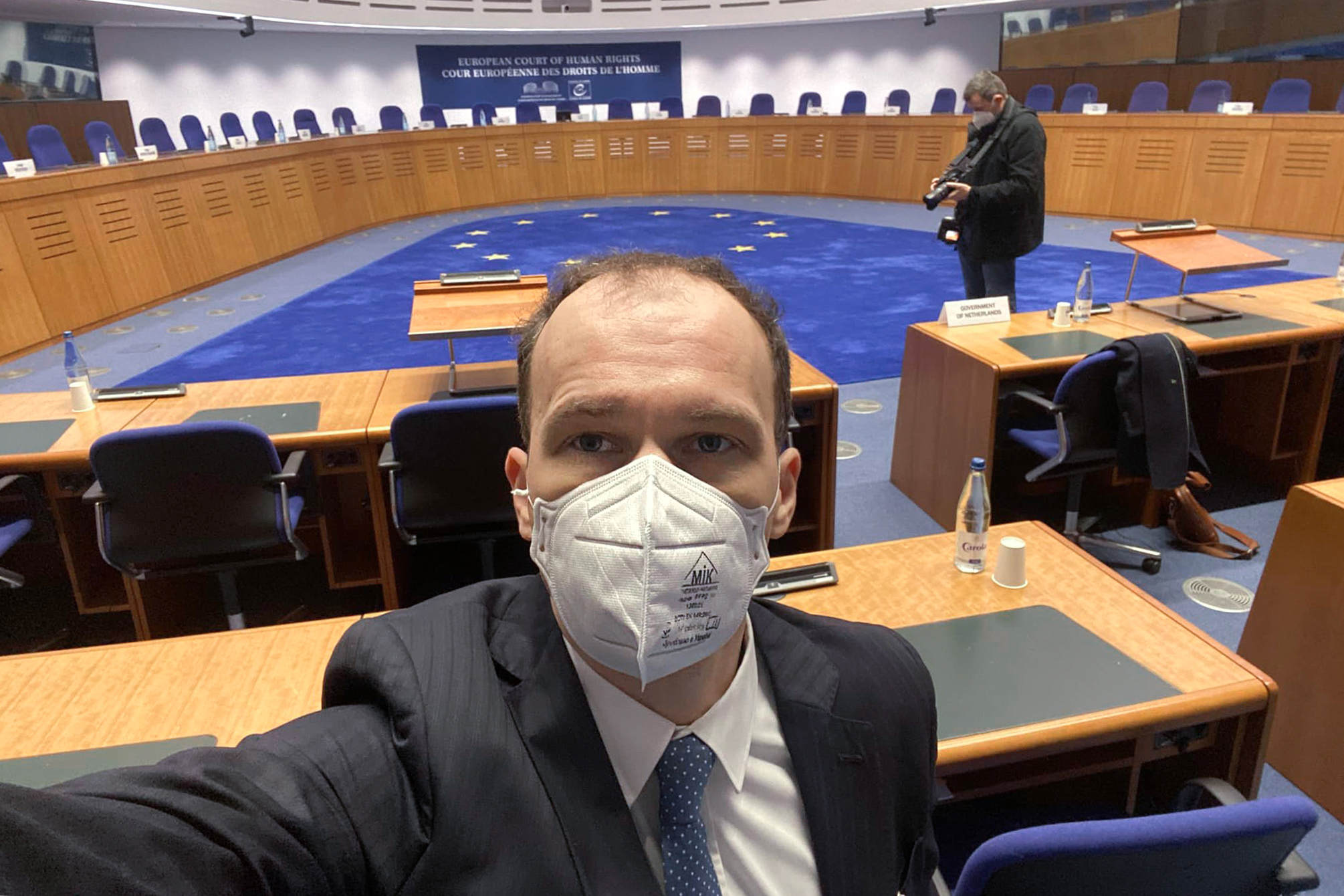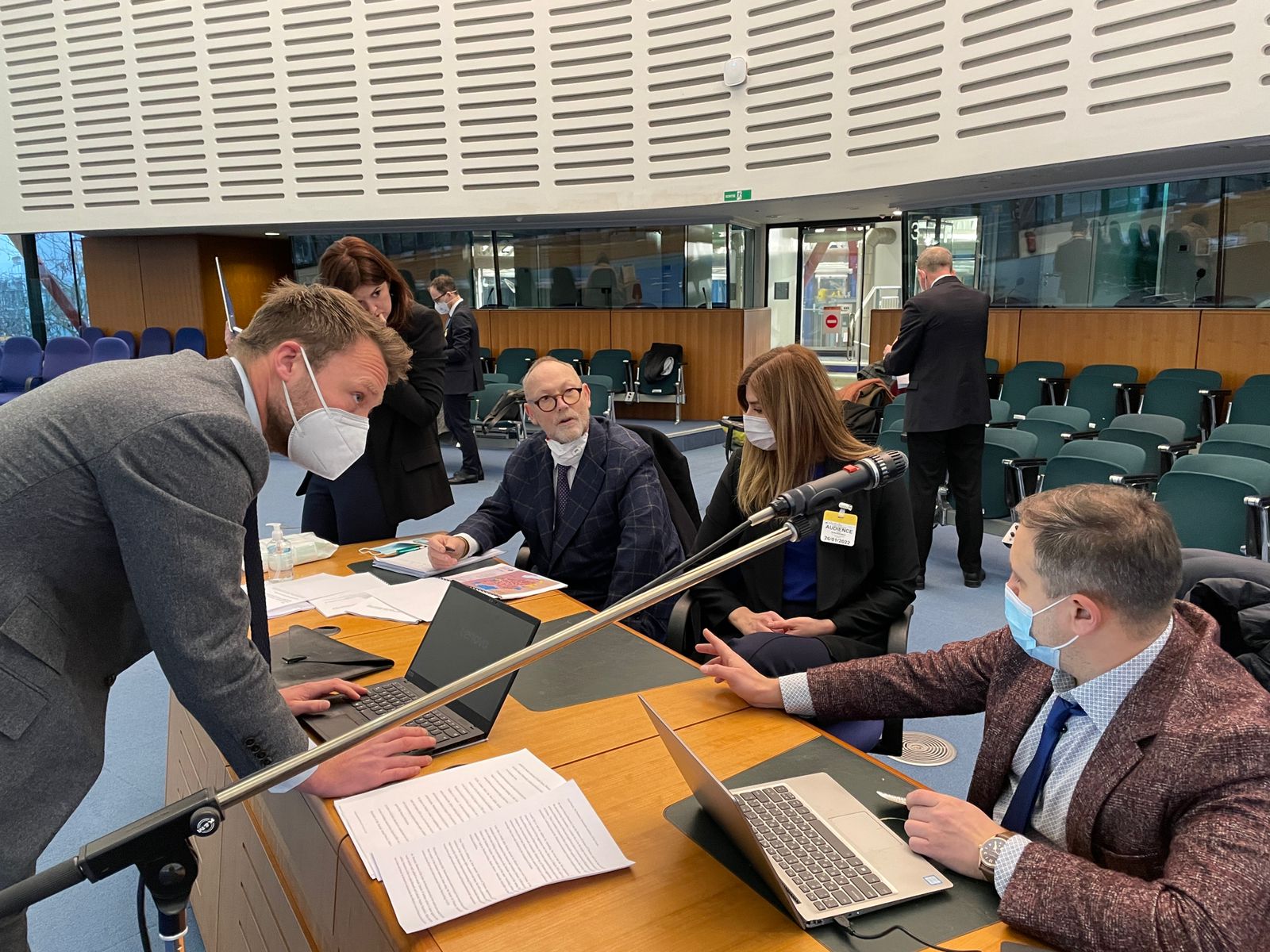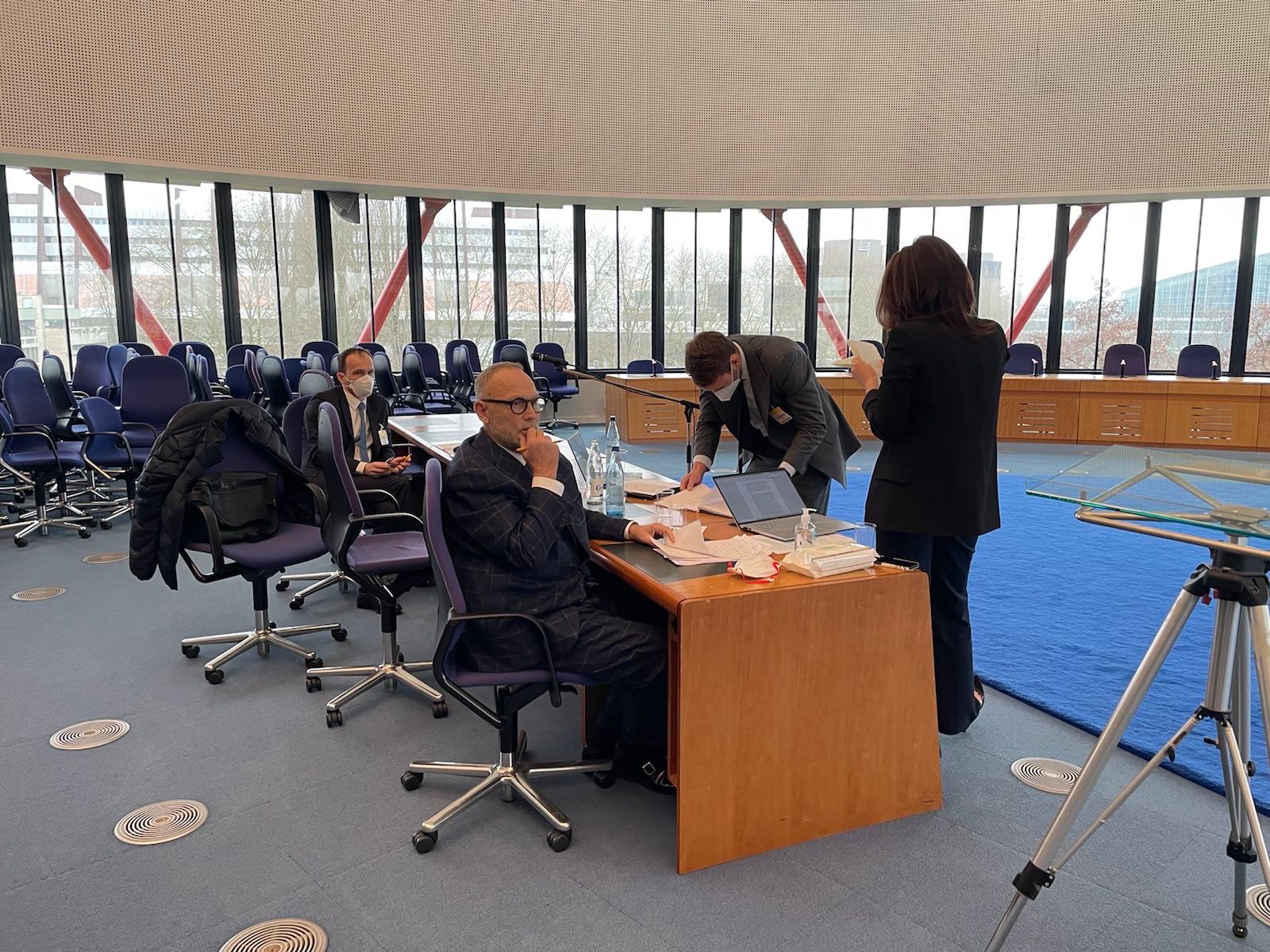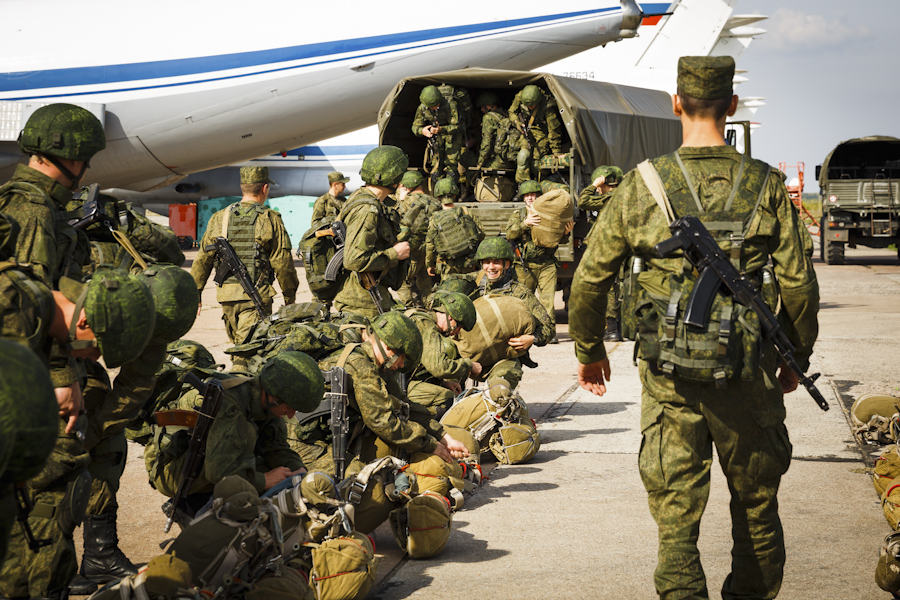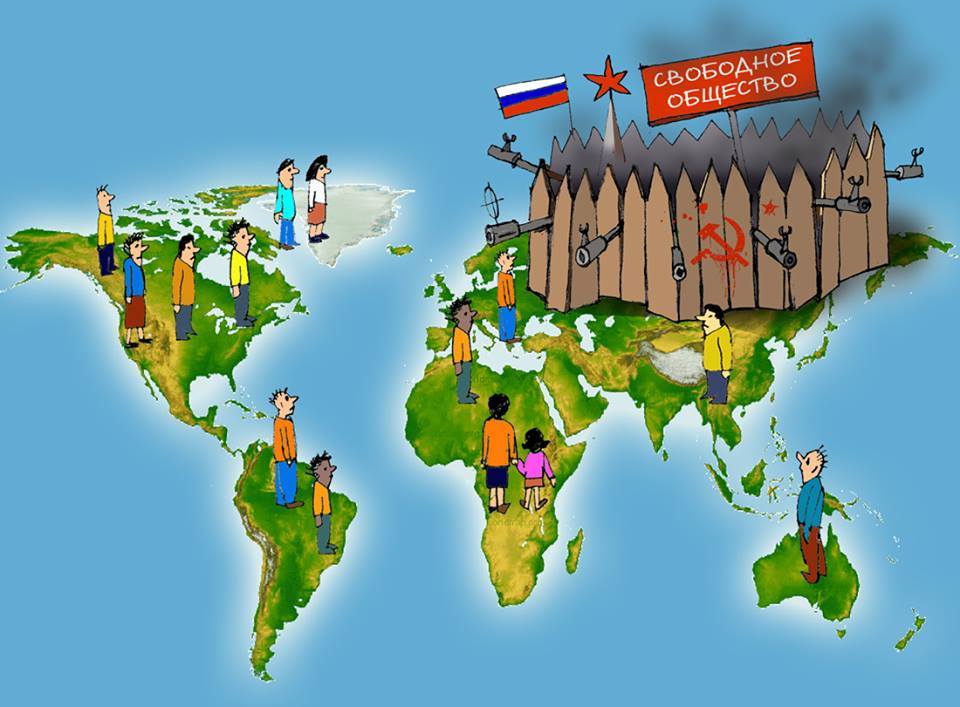On 26 January 2022, the Grand Chamber of the Strasbourg-based European Court of Human Rights (ECHR) started open hearings on admissibility in the inter-state case of Ukraine and the Netherlands v. Russia.
The case pertains to the events in Donbas, in the eastern region of Ukraine, including the downing of Malaysia Airlines MH17 flight on 17 July 2014 that killed 298 people, among them 196 Dutch nationals.
Over the next 2-2.5 years, the ECHR will decide whether it has jurisdiction to consider Russia’s human rights abuses in Donbas since its occupation in April 2014.
If the court upholds that Russia had effective control over the occupied territories of Donbas (de facto occupied them), the court will consider the case on its merits and Russia may bear responsibility for grave human rights violations. [/box]
Ukraine was represented by its Ministry of Justice, and the Netherlands by its Ministry of Foreign Affairs, and Queen's Counsel, together with qualified lawyers. Russia was represented by their Prosecutor General’s Office.
In the four-hour hearing, the atmosphere was tense. Representatives of relatives of victims were present in the courtroom. One of them, Piet Ploeg, acted as the official representative of the Dutch government.
Attendees responded to the arguments of the Russian lawyer with resentment. When he claimed that Russia was ready to investigate the downing of the Malaysia Airlines flight MH17, an observer from the assembly called out, “So start doing it right now!” The judge did not respond to the outburst, although in the opinion of many he had every right to have ordered the person to leave the room.
What you should know about the case
On 27 November 2020, the ECHR merged the two applications by Ukraine and the one application by the Netherlands into a single motion.
- Ukraine v. Russia case no. 8019/16 lodged on 13 March 2014. Ukraine alleges that Russia is responsible for mass and systematic human rights violations in occupied Donbas (including violations of the right to life and freedom from torture).
- Ukraine v. Russia (II) no. 43800/14 lodged on 13 June 2014. Ukraine alleges the abduction of children in eastern Ukraine from Donbas and their temporary transfer to Russia (including violations of the right to life and freedom from torture; inhumanity to liberty and security; respect for private life; and freedom of movement).
- The Netherlands v. Russia no. 28525/20 lodged on 10 July 2020. The application concerns the shooting down on 17 July 2014 of Malaysia Airlines flight MH17 over eastern Ukraine, killing 298 persons, 196 of whom were Dutch citizens (including violations of the right to life and to freedom from torture, and the right to an effective remedy).
Ukraine argues that Russia had effective control over occupied Donbas, and thus is responsible for human rights violations on those territories from April 2014. This is the applicants’ main goal at this stage. Both Kyiv and Amsterdam are requesting the court to rule that Russia shot down the plane.
To be successful, applicants must argue what the date of occupation was, and to show which localities were Russia-occupied at that time.
Regarding the body of evidence and number of violations, this case is the largest the ECHR has ever considered. It includes thousands of documents, dozens of hours of videotapes, and terabytes of digital photos, testimonies, and interviews.
“Most evidence we provided … [it’s terrible]. It is testimonies of victims, evidence of deaths, killings and tortures. Really, to look at all of this is very difficult,” said Ukraine’s Minister of Justice Denys Maliuska in an interview with European Pravda.
Maliuska represented Ukraine in the ECHR on 26 January 2022.
What is Ukraine’s position in Strasbourg?
Ukraine’s stance in the ECHR includes three key points:
- Russia occupied the eastern part of Ukraine in April 2014, following the annexation of Crimea. To prove this, Ukraine presents as evidence of occupation the possibility to conduct organized events, such as pseudo-referenda. Russia is also exerting military, economic, and political control over the authorities of self-proclaimed republics.
- Russian aggression is a long-term consistent state policy to stop Ukraine from its European track.
- Russia is responsible for systemic and lasting violations of human rights in territories of eastern Ukraine, including the shooting down of Malaysia Airlines flight MH17.
UK researchers trace 95% of weapons in Ukraine warzone to Russian manufacturers
How will Ukraine prove this?
To prove that Russia, in fact, occupied Donbas, Ukraine presents evidence that:
- Russia’s armed forces crossed the border to separatist-controlled territories of Ukraine.
- Militants from the territory of Russia bombarded the armed forces of Ukraine acting within the anti-terrorist operation.
- Russia supplied militants of the occupied territories with arms, including new weapons not employed by the Ukrainian army.
- Russia used drones in the conflict, new types of weapons that could not have otherwise been deployed in Donbas.
It is not enough to prove that Russia occupied part of Ukraine. In the ECHR, the applicant must justify that the respondent violated human rights in the specific region.
Importantly, these violations can not be isolated cases, they must be systemic abuses, referred to as “administrative practice.”
Next, Ukraine argues that victims had no access to legal remedies. In other words, there was no court or law enforcement body that could hold perpetrators liable and make them compensate for victims.
- Google Earth imagery reveals major Russian invasion in summer 2014
- What we know about Russian troops in eastern Ukraine
- Bellingcat publishes interactive map of Russian artillery strikes across Ukrainian border
- UK researchers trace 95% of weapons in Ukraine warzone to Russian manufacturers
- Ukrainian OSINT sleuths release largest existing database of evidence of Russian aggression in Ukraine
What is Russia’s position?
Moscow chose the approach of total denial. They claim that Russia’s jurisdiction does not extend to the territories of the Donetsk and Luhansk oblasts of Ukraine, that Russia does not control these territories, and that Russia is not a party to the conflict.
According to Russian respondents, if the court presumed economic and humanitarian support for self-proclaimed “Donetsk People’s Republic” (“DNR”) and “Luhansk People’s Republic” (“LNR”) then EU’s financial aid to Kyiv could also be considered as effective control over Ukraine.
With regard to the shooting down of the Malaysia MH17 Boeing, Russia argues that the Netherlands bases its application on fabricated evidence and accusations. It adds that the incident took place on Ukraine’s territory, where many Ukrainian planes were shot down in that period of time.
In the absence of compelling arguments, Mikhail Vinogradov, Representative of the Russian Federation at the ECHR, and Head of the General Directorate of International Legal Cooperation, took to lies about MH17. He misinterpreted the findings of the Joint Investigation Team (JIT), composed of the Netherlands, Malaysia, Australia, Belgium and Ukraine.
Vinogradov stated the JIT found that the missile which shot down the plane was Ukrainian and was launched from Ukraine-controlled territory. But in fact, the JIT discovered that the missile was shot from Snizhne, a territory not controlled by Kyiv.
Ben Emmerson, the British lawyer representing Ukraine, responded:
“It is a lie. It is not a mistake but specifically a lie. And the Russian government knows it is lying because it sent this missile. It is an attempt to undermine this judicial institution. Russia is lying to your face. And it is doing so with the knowledge that you are aware it is lying.”
Why is this case so significant for Ukraine?
- To have hard facts that Russia is occupying Donbas. With a legal decision of a regional court – not just political statements – recognizing Russia as an aggressor responsible for systemic human rights violations, Ukraine will have a powerful card to play in international negotiations. Moreover, the decision may become grounds for diplomatic pressure on Moscow and new sanctions.
- To set a date for and borders of Russia occupation. This will set the foundation for future actions of the international community. On 14 January 2021, the ECHR ruled that Russia de facto controlled Crimea, and thus bears responsibility for human rights violations on the peninsula since 27 February 2014. That is, all facts that took place after 27 February are legally null and void. Namely, the illegal referendum from 16 March 2014 in which Crimeans “decided” to accede to Russia.
- To provide the court with the body of evidence which Ukrainian applicants will refer to when complaining against Russia. If not for this work of Ukrainian lawyers, individuals would not be able to file this evidence.“They do not have access to criminal proceedings, they did not collect evidence on the territory of the Russian Federation, they do not have access to the materials of interviews. We established these facts. And next, based on them, one can bring to the RF both inter-state and individual claims,” says Denys Maliuska.
- To have Russia compensate the victims of human rights violations.
Russia’s attempts to postpone the decision
According to Denys Maliuska, Russia has not just one time tried to deliberately postpone the court hearing. Initially, the meeting was planned to be held on 24 November 2021. But was postponed under the pretext of Russia’s COVID measures and an inadequately prepared application against Ukraine.
When the court rejected this appeal, on 8 November, the Russian ad hoc judge claimed circumstances that could question his impartiality. Thus, he recused himself. The hearing was then postponed to 26 January 2022.
Events leading up to ECHR open hearings, 26 January 2022
- Nov 2013 - Feb 2014 - Euromaidan Revolution, Kyiv
- 27 February 2014 - Russia occupies Crimea
- 13 March 2014 - Ukraine lodges (1st) complaint to ECHR for human rights crimes in Donbas
- 16 March 2014 - Russia holds mock referendum for Crimea to accede to Russia
- April 2014 - Russia invades Donbas
- 13 June 2014 - Ukraine lodges (2nd) complaint to ECHR for the abduction of children in Donbas
- 17 July 2014 - Downing of Malaysia Airlines flight MH17
- 10 July 2020 - The Netherlands lodges ECHR complaint for downing of MH17
- 27 November 2020 - ECHR merges Ukrainian and Dutch complaints
- 14 January 2021 - ECHR rules that Russia de facto controls Crimea
- 8 November 2021 - Russian judge recuses himself from ECHR hearings
- 26 January 2022 - ECHR starts open hearings on admissibility of the case Ukraine and the Netherlands v. Russia
Related:
- Ukraine’s evidence in ECtHR: proof of Russia’s occupation of Crimea, human rights violations
- Ukraine wins crucial round against Russia over Crimea in the European Court of Human Rights
- Russian disinformation activities accompanying the MH17 trial
- Legal battle: How Ukraine sues Russia in international courts
- Russia in The Hague: the lies, the fakes, and the fairy tales
- How Russia will try to sue Ukraine in the European Court of Human Rights
- Ukraine reveals proof that Russian officers directed rocket attack on Mariupol in 2015
- How Ukraine will try to prove Russia finances terrorism
- Ukraine reveals Russian-made weapons, explosives found in occupied Donbas
- 600-800 Russian military officers and generals permanently deployed to Donbas – Ukraine’s intelligence
- MH17 trial: Donbas “rebels” sent targets for Russia’s artillery attacks on Ukrainian bases
- Digital sleuths name soldiers from Murmansk and Chechnya who fought against Ukraine in 2014


